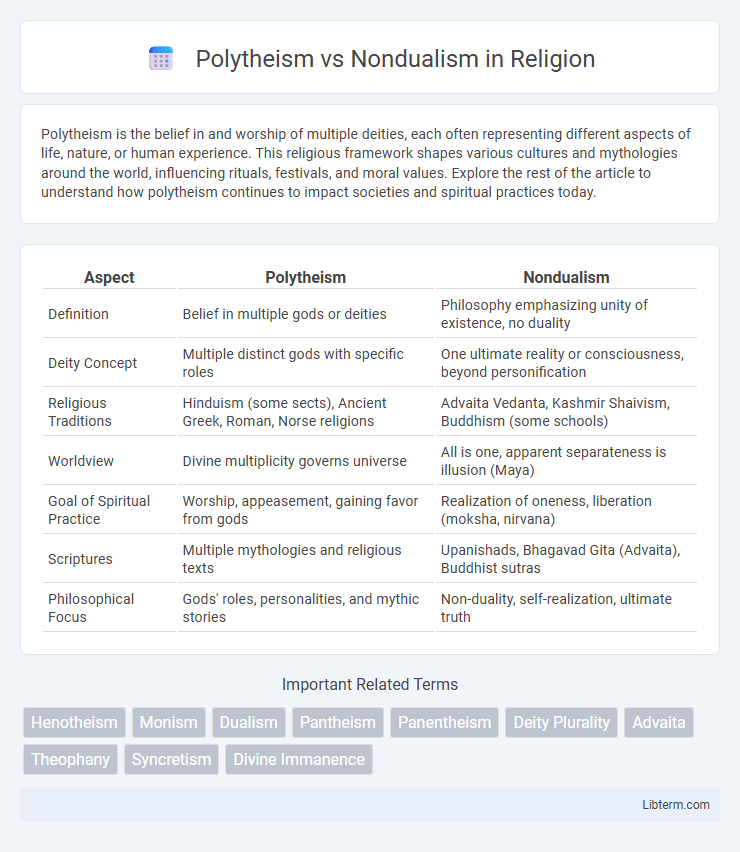Polytheism is the belief in and worship of multiple deities, each often representing different aspects of life, nature, or human experience. This religious framework shapes various cultures and mythologies around the world, influencing rituals, festivals, and moral values. Explore the rest of the article to understand how polytheism continues to impact societies and spiritual practices today.
Table of Comparison
| Aspect | Polytheism | Nondualism |
|---|---|---|
| Definition | Belief in multiple gods or deities | Philosophy emphasizing unity of existence, no duality |
| Deity Concept | Multiple distinct gods with specific roles | One ultimate reality or consciousness, beyond personification |
| Religious Traditions | Hinduism (some sects), Ancient Greek, Roman, Norse religions | Advaita Vedanta, Kashmir Shaivism, Buddhism (some schools) |
| Worldview | Divine multiplicity governs universe | All is one, apparent separateness is illusion (Maya) |
| Goal of Spiritual Practice | Worship, appeasement, gaining favor from gods | Realization of oneness, liberation (moksha, nirvana) |
| Scriptures | Multiple mythologies and religious texts | Upanishads, Bhagavad Gita (Advaita), Buddhist sutras |
| Philosophical Focus | Gods' roles, personalities, and mythic stories | Non-duality, self-realization, ultimate truth |
Understanding Polytheism: Core Concepts
Polytheism centers on the belief in multiple deities, each representing distinct aspects of nature, life, or cosmic functions, creating a diverse pantheon with specialized roles. Core concepts include divine hierarchy, ritual worship, and mythological narratives that explain natural phenomena and human experiences. This contrasts with nondualism's emphasis on an indivisible ultimate reality, highlighting the multiplicity and relational nature intrinsic to polytheism.
Unpacking Nondualism: Essential Principles
Nondualism emphasizes the fundamental oneness of all existence, rejecting the dichotomy between subject and object, self and other. It asserts that apparent dualities are illusions arising from limited perception, guiding practitioners toward the realization of an indivisible reality beyond multiplicity. This core principle contrasts with polytheism, which recognizes multiple distinct deities governing diverse aspects of the cosmos.
Historical Origins of Polytheism and Nondualism
Polytheism traces its origins to ancient civilizations such as Mesopotamia, Egypt, and Greece, where multiple deities personified natural forces and human experiences, reflecting early human attempts to explain the cosmos through diverse divine entities. Nondualism, rooted in Indian philosophies like Advaita Vedanta and early Buddhist teachings, emphasizes the essential oneness of reality, rejecting dualistic distinctions between self and other, subject and object. These contrasting historical origins illustrate polytheism's pluralistic portrayal of divine multiplicity versus nondualism's monistic focus on ultimate unity.
Key Differences Between Polytheism and Nondualism
Polytheism involves the worship of multiple deities, each with distinct identities and attributes, reflecting a diversity of divine forces. Nondualism emphasizes the unity of all existence, asserting that the ultimate reality is a single, indivisible entity beyond individual gods or forms. The key difference lies in polytheism's pluralistic divine framework versus nondualism's monistic, unified conception of reality.
Philosophical Foundations: Many Gods vs. One Reality
Polytheism posits the existence of multiple gods, each embodying distinct aspects of the universe and human experience, reflecting a diverse and pluralistic cosmology. Nondualism, central to Advaita Vedanta and certain Eastern philosophies, asserts the fundamental oneness of all existence, where apparent multiplicity is an illusion and ultimate reality is a singular, indivisible consciousness. The philosophical foundation of polytheism emphasizes multiplicity and relational divinity, while nondualism emphasizes unity and the dissolution of individual distinctions into one underlying reality.
Rituals and Practices in Polytheistic Traditions
Polytheistic traditions encompass diverse rituals that honor multiple deities through offerings, ceremonies, and festivals, each deity representing distinct aspects of life and nature. These practices often involve temple worship, chanting, and symbolic acts aimed at invoking divine favor and maintaining cosmic balance. In contrast, nondualism emphasizes inner meditation and realization of the unity underlying apparent multiplicity, focusing less on external rituals and more on personal spiritual experience.
Meditative and Mystical Approaches in Nondualism
Meditative and mystical approaches in nondualism emphasize direct experiential realization of the unified nature of reality beyond dualistic distinctions inherent in polytheistic frameworks. Techniques such as self-inquiry, mantra repetition, and deep meditation facilitate transcending ego boundaries, revealing an indivisible consciousness that underlies apparent multiplicity. Unlike polytheism's worship of multiple deities as separate entities, nondualistic paths cultivate an inner transformation aimed at unveiling interconnectedness and oneness beyond form and name.
Interplay of Polytheism and Nondualism in World Religions
Polytheism and Nondualism often coexist in world religions, where multiple deities represent diverse aspects of a single ultimate reality, exemplified in Hinduism's Trimurti concept blending multiplicity with a unified Brahman. The interplay between polytheistic personifications and nondual philosophical doctrines facilitates a comprehensive spiritual framework that accommodates both personal worship and abstract metaphysical understanding. This synthesis enriches religious experience by integrating relational divine forms with the indivisible essence of existence.
Modern Perspectives: Relevance in Contemporary Spirituality
Modern perspectives on polytheism emphasize its role in fostering diverse spiritual expressions and ecological awareness through the reverence of multiple deities representing natural forces. Nondualism, prominent in contemporary spirituality, encourages the dissolution of ego and the realization of oneness, appealing to those seeking inner harmony and universal connection. Both frameworks influence mindfulness practices, interfaith dialogue, and holistic healing modalities in today's global spiritual landscape.
Harmonizing Diverse Spiritual Paths: Synthesis and Dialogue
Polytheism celebrates a multiplicity of deities, each representing distinct forces and aspects of life, fostering a rich tapestry of spiritual expressions. Nondualism emphasizes the underlying unity beyond apparent dualities, advocating an experiential realization of oneness that transcends individual forms. Harmonizing these paths involves synthesizing the devotional plurality of polytheism with nondual insight, creating a dynamic dialogue that appreciates diverse spiritual truths while guiding practitioners toward an integrated awareness of ultimate reality.
Polytheism Infographic

 libterm.com
libterm.com